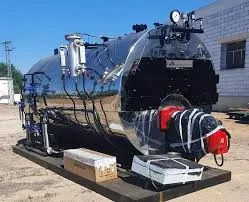
Nov . 10, 2024 03:37 Back to list
Hot Water Boiler System Design for Efficient Heating Solutions in Residential Applications
Hot Water Boiler System An Overview
A hot water boiler system is an essential component in many residential and commercial heating applications. Its primary function is to heat water for various purposes, including space heating, domestic hot water supply, and industrial processes. Understanding the components, operation, and maintenance of a hot water boiler system can significantly enhance its efficiency, ensure safe operation, and prolong its lifespan.
Components of a Hot Water Boiler System
At its core, a hot water boiler system consists of several key components
1. Boiler The boiler is the heart of the system. It uses fuel (gas, oil, or electricity) to heat water. Depending on the design, boilers can be categorized into different types, including conventional, condensing, and combi boilers. Each type serves a specific purpose and has its own set of advantages.
2. Heat Exchanger This component allows heat transfer from the burner to the water, ensuring that the water is heated efficiently without direct contact with the flame or heating element.
3. Pump A pump circulates hot water throughout the heating system. It ensures that heated water reaches radiators or underfloor heating systems in a timely and efficient manner.
4. Expansion Tank As water heats, it expands. An expansion tank accommodates this increase in volume, preventing pressure build-up that could potentially damage the system.
5. Thermostat This device regulates the temperature of the water, ensuring that the boiler maintains the set temperature for efficient heating.
6. Piping and Valves A network of pipes distributes hot water to different parts of the building, while valves control the flow of water and allow for maintenance or isolation of the boiler system.
How the System Works
The operation of a hot water boiler begins when cold water enters the boiler from the main supply line. The boiler ignites, heating the water to the desired temperature. Once heated, the water travels through the pump, which pushes it through pipes to radiators or heating coils located throughout the building. As the hot water circulates, it transfers heat to the surrounding air, effectively warming the space.
hot water boiler system

When the thermostat detects that the indoor temperature has reached the set point, it signals the boiler to shut off
. The system is designed to maintain a balanced temperature, preventing fluctuations that could lead to discomfort.Benefits of a Hot Water Boiler System
Hot water boiler systems are preferred in many locations due to their efficiency and effectiveness. Some notable benefits include
- Energy Efficiency Modern boilers are designed to maximize energy use, leading to lower utility bills and reduced environmental impact. Many new models boast high efficiency ratings, which ensure that a significant portion of the energy consumed is converted into usable heat.
- Consistent Heating Boilers provide even and consistent heating throughout a space. Unlike forced-air systems, which can create hot and cold spots, hot water systems deliver a steady source of warmth.
- Low Noise Levels Hot water systems operate quietly compared to traditional heating systems, making them ideal for residential areas or spaces where noise control is essential.
Maintenance and Safety
Regular maintenance of a hot water boiler system is crucial for its longevity and safe operation. Key maintenance practices include
- Annual Inspections It’s recommended to have a qualified professional inspect the boiler annually to ensure it operates efficiently and identify any potential issues before they become serious problems.
- Flue Maintenance Ensuring that the flue or venting system is clear of blockages is essential for safety, as this prevents the buildup of dangerous gases.
- Water Quality Monitoring and maintaining the quality of water used in the system can prevent scale buildup, corrosion, and other problems.
In conclusion, a hot water boiler system is a reliable and efficient method for heating water in various applications. Understanding its components and operation, as well as committing to regular maintenance, will ensure optimal performance and extend the life of the system. With advancements in technology, modern boiler systems are more efficient than ever, making them a valuable choice for any heating needs.
-
High-Efficiency Commercial Oil Fired Steam Boiler for Industry
NewsJul.30,2025
-
High-Efficiency Biomass Fired Thermal Oil Boiler Solutions
NewsJul.30,2025
-
High Efficiency Gas Fired Thermal Oil Boiler for Industrial Heating
NewsJul.29,2025
-
High-Efficiency Gas Fired Hot Water Boiler for Sale – Reliable & Affordable
NewsJul.29,2025
-
High Efficiency Biomass Fired Hot Water Boiler for Industrial and Commercial Use
NewsJul.29,2025
-
High-Efficiency Biomass Fired Hot Water Boiler for Industrial Use
NewsJul.28,2025
Related PRODUCTS






















